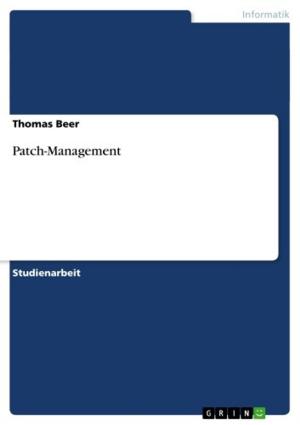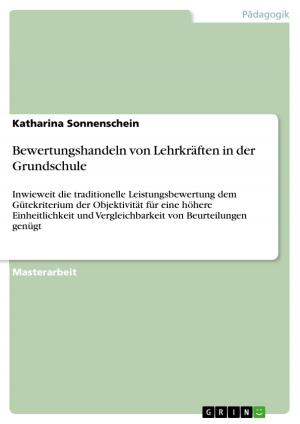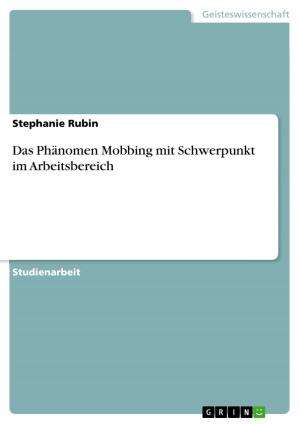Henry James' 'The Art of Fiction' and the application of his theory in 'What Maisie knew'
'A novel is in its broadest definition a personal, a direct impression of life'
Fiction & Literature, Literary Theory & Criticism, British| Author: | Sebastian Frese | ISBN: | 9783640162888 |
| Publisher: | GRIN Verlag | Publication: | September 12, 2008 |
| Imprint: | GRIN Verlag | Language: | English |
| Author: | Sebastian Frese |
| ISBN: | 9783640162888 |
| Publisher: | GRIN Verlag |
| Publication: | September 12, 2008 |
| Imprint: | GRIN Verlag |
| Language: | English |
Seminar paper from the year 2007 in the subject English Language and Literature Studies - Literature, grade: 1,3, University of Freiburg (Englisches Seminar), course: The Art of Fiction in 1890s Britain , 10 entries in the bibliography, language: English, abstract: Introduction Henry James is known not only as a novelist but also for his work as literary critic. In his famous essay 'The Art of Fiction' (1884), he reacted on a pamphlet that the British author Walter Besant had published under the same title earlier that year. In fact, a discussion and controversy on the novel had already been started in 1882 with Howells' 'Henry James Jr.' and Stevenson's 'A Gossip of Romance'. James used the opportunity to present his ideas on the novel of fiction: 'A novel is in its broadest definition a personal, a direct impression of life' 1. It is very important for him to stress that life is personally -and therefore subjectively- received by an author who than tries to represent life in his2 work. James offers in his essay various new aspects that a novelist should be aware of and make use of if he wants to write a realistic and true novel. This essay deals with the novel What Maisie knew (first published in 1897) which is one of the less known and less studied novels written by Henry James. Critics see it as a work in which James has left the `mainstream literature´ that the literary market asked for and has realised some of his ideas he had coped with in theory already in the 1880's when he wrote 'The Art of Fiction'. Most of these critics have studied the morality in What Maisie knew and the innovation to present the story from a child's consciousness. This essay is not interested in the moral aspect of the novel but raises the question if Henry James put into practise his own theory when he wrote Maisie more than ten years after his 'Art of Fiction'. After presenting the main arguments of James' theory, I will scrutinise whether James really has put his theory into practice. Most attention will be turned to his ideas of a realistic writing, looking not only at the aspect of how to write a realistic novel but also of how to create a realistic atmosphere. This essay will try to prove that Henry James did practise his own preaching at least to a certain degree in What Maisie knew and show where James' realistic fiction might reach its limits.
Seminar paper from the year 2007 in the subject English Language and Literature Studies - Literature, grade: 1,3, University of Freiburg (Englisches Seminar), course: The Art of Fiction in 1890s Britain , 10 entries in the bibliography, language: English, abstract: Introduction Henry James is known not only as a novelist but also for his work as literary critic. In his famous essay 'The Art of Fiction' (1884), he reacted on a pamphlet that the British author Walter Besant had published under the same title earlier that year. In fact, a discussion and controversy on the novel had already been started in 1882 with Howells' 'Henry James Jr.' and Stevenson's 'A Gossip of Romance'. James used the opportunity to present his ideas on the novel of fiction: 'A novel is in its broadest definition a personal, a direct impression of life' 1. It is very important for him to stress that life is personally -and therefore subjectively- received by an author who than tries to represent life in his2 work. James offers in his essay various new aspects that a novelist should be aware of and make use of if he wants to write a realistic and true novel. This essay deals with the novel What Maisie knew (first published in 1897) which is one of the less known and less studied novels written by Henry James. Critics see it as a work in which James has left the `mainstream literature´ that the literary market asked for and has realised some of his ideas he had coped with in theory already in the 1880's when he wrote 'The Art of Fiction'. Most of these critics have studied the morality in What Maisie knew and the innovation to present the story from a child's consciousness. This essay is not interested in the moral aspect of the novel but raises the question if Henry James put into practise his own theory when he wrote Maisie more than ten years after his 'Art of Fiction'. After presenting the main arguments of James' theory, I will scrutinise whether James really has put his theory into practice. Most attention will be turned to his ideas of a realistic writing, looking not only at the aspect of how to write a realistic novel but also of how to create a realistic atmosphere. This essay will try to prove that Henry James did practise his own preaching at least to a certain degree in What Maisie knew and show where James' realistic fiction might reach its limits.















